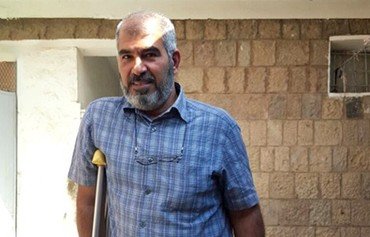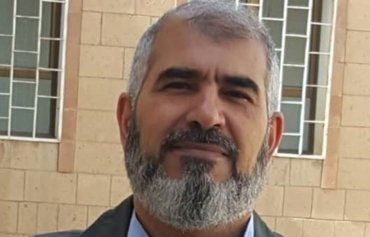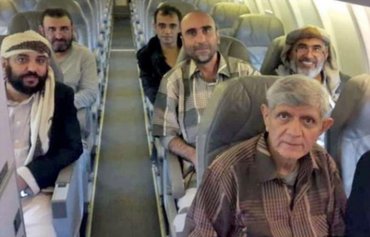The Iran-backed Houthis (Ansarallah) on Wednesday (March 25th) ordered the release of all Bahai prisoners and issued a pardon to Hamid bin Haydara, a prisoner of conscience of the Bahai faith they had sentenced to death.
The pardon came just days after the Houthi-run Court of Appeals in Sanaa on Sunday upheld a death sentence handed down against Haydara in January 2018.
The pardon and release decision was announced by Mahdi al-Mashat, head of the Houthis' so-called Supreme Political Council, in a televised speech marking the fifth anniversary of the ongoing war in Yemen.
Local and international organisations, including Amnesty International, had called on the Houthis to overturn the death sentence against Haydara and to release all Bahai prisoners detained for their religious beliefs.
The religious minority has faced systematic persecution under the Houthis.
Haydara was arrested in December 2013 at his place of work on religious grounds and subjected to torture and psychological abuse. He has been denied access to medical treatment and visits, including from his wife and daughters.
Amnesty International said Wednesday that in the past year, the Houthis have stepped up their use of an anti-terrorism court as a way to settle political scores.
"The Houthis must end the use of the judicial system to stifle freedom of expression, association and religion, by way of handing down harsh sentences, including the death penalty, following grossly unfair trials," Amnesty said.
Amnesty has documented the cases of 66 individuals brought before the Sanaa-based Specialised Criminal Court -- a court traditionally reserved for terrorism-related cases, between 2015 and 2020.
"Journalists, human rights defenders, political opponents and members of religious minorities are among those subjected to unfair trial on spurious or trumped-up charges by this court," the rights group said.
Rights groups welcome decision
The Bahai International Community (BIC) welcomed the Wednesday announcement, and called for its immediate implementation.
"The six Bahais to be released -- who have been wrongfully imprisoned in Sanaa for several years on the basis of their religious beliefs and made to face a series of baseless charges -- include Hamid bin Haydara, Waleed Ayyash, Akram Ayyash, Kayvan Ghaderi, Badiullah Sanai and Wael al-Arieghie," the BIC said.
"Today's order must lead to the lifting of the 2018 charges against a group of over 20 Bahais, the returning of all Bahai-owned assets and properties, and the functioning of Bahai institutions," the BIC said in a Wednesday statement.
"Like all other Yemeni citizens, Bahais should be permitted to practice their faith freely, in keeping with the universal principles of freedom of religion or belief."
The Yemeni Initiative for Defending Bahais' Rights welcomed the decision to release and pardon Haydara, and thanked all who contributed to the decision.
"After more than six years of detention and trials, Haydara has been released," it said in a social media post. "We are now trying to get more information on the date and mechanism of release."
"We are full of hope that this will be the end of persecution against this Yemeni component," it said.
Activists express skepticism
Rights activist Hoda al-Sarari said the decision was good, despite the entity that issued it, pointing out that "the trial was a farce, and the decision was the result of media pressures".
The Houthis are trying to play it both ways, lawyer and rights activist Abdul Rahman Barman told Al-Mashareq.
"Following the arrests, torture and unjust trials, accompanied by extortion, the Houthis handed down a death sentence and then issued a pardon," he said.
"The issue of the release and pardon decision at this time is aimed at presenting the Houthis in a positive light to win favour with the international community," he said.
"But I think this is all useless, because the world already knows that the Houthis are an armed group that has always exploited courts," Barman said.
"They even created this court after it was abolished by the legitimate government and appointed some of their elements as judges to run it," he said.
"The Houthis want to create a media fuss about the pardon decision to receive some praise from foreign entities," he said, noting that the real goal is extortion.
"After they handed down the death sentence, I expected them to issue a pardon either to win favour with the international community or extort the detainees' families," he said.
"They also were thinking about extortion through [trying to bring about] a prisoner swap by threatening to enforce the death sentences," he explained.
Meanwhile, in a social media post, journalist Munir al-Maweri said the Houthis' release and pardon decision was the result of listening to advice.
"The release and pardon is a wise and promising decision," he said. "This wisdom should be praised because it defused incitement against our country."

![Hamed bin Haydara, a Yemeni Bahai, was arbitrarily arrested in December 2013 and has faced a lack of due process, mistreatment, and torture ever since. [Photo courtesy of Bahai World News Service]](/cnmi_am/images/2020/03/26/23229-Hamed-bin-Haydara-600_384.jpg)







Islam has shown the relations of Muslims among themselves and with others. Islam orders Muslims not to ally themselves with those who have demonstrated enmity to Islam and to deal justly with those who don’t show enmity to Islam. God Almighty says, “Allah does not forbid you from those who do not fight you because of religion and do not expel you from your homes – from being righteous toward them and acting justly toward them.” When the Prophet lived in Medina, he established a relation with the city’s Jews and guaranteed their freedom of belief. However, when they reneged on their promises and showed enmity to Muslims and to his battles against the Romans and Persians, he removed them. This was because they repelled and blocked his efforts to spread the message of Islam, killed messengers, showed enmity to Islam and prevented people from converting to Islam. When Muslims conquered countries, they didn’t force anyone to convert to Islam; rather, their morals and dealings made many convert to Islam.
Reply1 Comment(s)